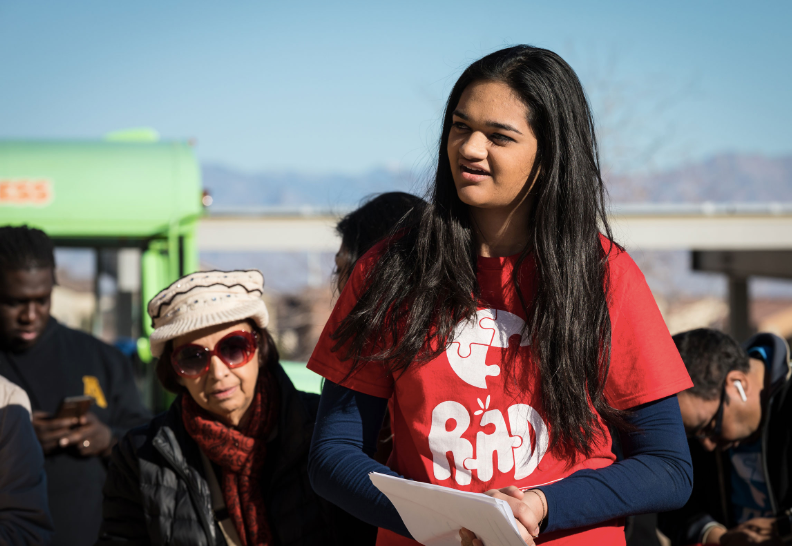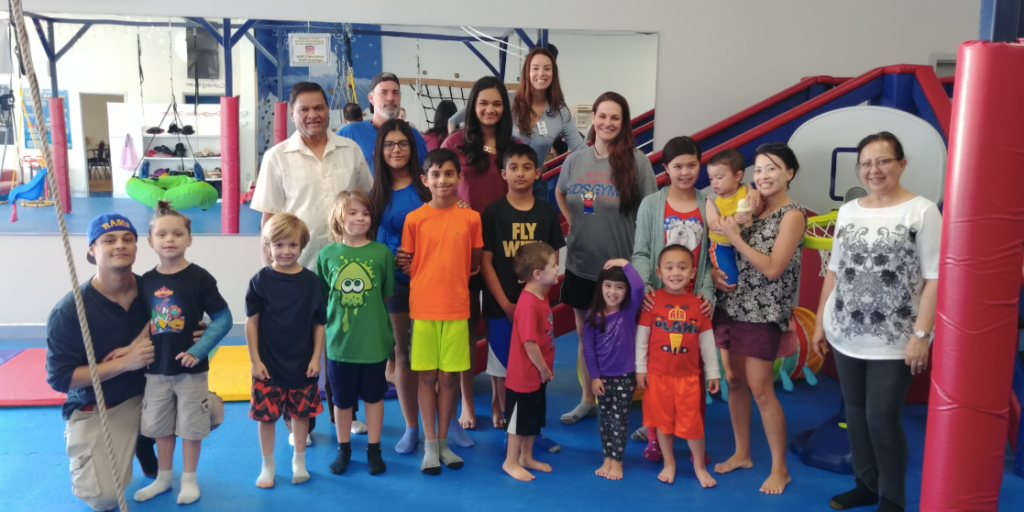Teenager Starts Nonprofit to Help Children with Autism Throughout Southern Nevada

While most remember their sixteenth birthday as the day they were able to get their driver’s permit, Radhika Shah’s sweet sixteen will be remembered a bit differently — it was the day she started her nonprofit organization, Real Autism Difference (RAD). The Nevada native’s goal was to create an organization where families with children diagnosed with autism could find support, education and activities that would positively impact their lives. RAD offers educational workshops, organized open play for children at sensory gyms and most recently, an after-school program and summer-care program. Although RAD only recently celebrated it’s first birthday, the organization has held about 20 events in the past year, from teaching workshops at a homeless shelter with autistic children, to a community 5k walk and run that saw over 700 attendees and close to 100 volunteers.
Radhika was inspired to start RAD based on her own family’s struggles to find adequate resources after her younger brother, who had previously been on the high-functioning autism spectrum, suddenly developed severe Autism Spectrum Disorder after an illness. She says one of the most rewarding parts of founding her own nonprofit has been being able to better connect with her community, through hearing the stories of other families with children with autism, as well as learning about and partnering with the other organizations and resources in her area.
“The southern Nevada community in general has been very supportive,” Radhika said. “Something that’s pleasantly surprised me was how many people, once you’re willing to speak to them about a cause, are willing to support it.”
For her selfless efforts in founding a nonprofit to fill an important need in her community, Radhika is today’s Daily Point of Light Award honoree. Points of Light spoke with her to learn more about how RAD helps children with autism and their families in southern Nevada.
And to hear more about Radhika’s story, you can listen to the TEDx talk she gave at the University of Las Vegas in 2018.
Describe your volunteer role with Real Autism Difference.
I’m the founder of Real Autism Difference, which is a nonprofit organization. I founded it last year for my 16th birthday, so we actually just had our one-year anniversary. Basically I coordinate a lot of the events that we do. RAD is an organization that holds different types of family educational workshops, we have open play at sensory gyms and local sensory areas, we do different events and then actually this year we started our after-school care program, which is for children with autism. The idea of Real Autism Difference is to provide resources for families in southern Nevada who have children with autism.
What inspired you to start Real Autism Difference?
My younger brother Amar is diagnosed with autism. He’s only a year and a half younger than me so I’ve always been really close with him. In middle school, I started volunteering in the special education classroom to spend more time with him, and that’s when I started to realize how many parents needed to leave work and pick up their children early because they didn’t have a place for their children to go after school. They didn’t have any sort of day care for their children with autism in case they needed to run errands. People like my brother need 24-hour supervision and if a parent goes to a grocery store, the child with autism has to go, and if the child can’t go to a grocery store then basically the parent just has to stay home with out child, if they require that supervision. I thought it was necessary to have a place where children could go and be supervised, sort of like a day care or a facility with a trained ADA therapist, where children with autism could go and their parents could run errands. That was something that was missing in southern Nevada and just didn’t exist.

What kind of feedback have you received from people who go through your after school program and their families?
I think actually it’s just been so great. We’ve had parents who have just started the after-school program, they said that it’s something that’s been extraordinarily helpful for them and it’s something that they find to be very beneficial and it acts as a good resource, so the feedback has been great. We have a summer break program starting soon, so we already have families registered and are excited for that. I think it’s just something that can only have positive feedback because so many families need it and I think that’s what makes it prominent in southern Nevada.
What do you want people to learn from your story?
My younger brother — it’s a crazy story. He was diagnosed with autism at the age of two so at a very young point, but he was high functioning. He could do second grade math, he could read, and he did have autism but it wasn’t as prevalent as it is now. We went on a vacation in central America and when we returned, he developed a very high fever. He lost bowel and bladder control, he lost his reading abilities, he lost his math abilities and he basically decompensated to a kindergartner or preschool level. We still don’t know what happened. We consulted several physicians across the country, and my parents are also physicians as well, and no one can figure out how he lost all these abilities and how he went from a high-functioning child on the spectrum to a really low-functioning child on the spectrum. Throughout the next decade, because it happened when he was five years old, we have been trying constantly to get him back to where he was. He’s made improvements but he’s still never where he was, at that high functioning ability. He’s a lot better now, but there was a point where he couldn’t even go to school. Now he goes to school, he goes to the same school as me, he’s in the special education classroom, but there was a point where he couldn’t go to school and he really couldn’t go out anywhere and I think just learning from that shaped me in so many ways.
Obviously having a child with autism, it can take a huge toll on families and there are many struggles that families have to endure and learn from and grow from. But I think that something we can always learn is that these negative experiences shape us. Oftentimes when we go through these struggles, we learn something from it and we can use that to help others. So I think if there’s anything that I’ve learned from this experience or that other people can learn, is that although those struggles are never good, we learn something from that and we can use that to help others and I think that’s powerful.
Are there any future partnerships, programs, or events that you are excited about?
Like I said, our summer program, continuing after-school programs and things like that, and just expanding that throughout the state, that’s something that we’re all looking forward to. Our two big events that we have throughout the year are our anniversary celebration which just passed … and we also have our annual 5k walk and run which is every January. At that event, we had like 700 people attend, which was great. That’s always a fun event so thats something we’re going to keep doing yearly.
Right now, we have open play at sensory gyms and recreational facilities, so basically depending on your age group, you can go to different sensory gyms that RAD partners with. We also have partnered with different groups at our local university and we have family education workshops there that we’re scheduling, which are basically seminars. And from time to time we like to do different workshops. One of the ones we did was at Shay Tree Homeless shelter. Children at this homeless shelter who also have autism, so a lot of care providers there, we were able to train them and let them better know how to take care of children with autism at this homeless shelter. So that was really amazing and I was really happy about that. So we just have different events from time to time, different workshops in the community and those are always great. RAD also believes in partnering with as many organizations as possible and also going to different events and things like that with other organizations, and working with them to expand. Because it’s really a community effort, so we’re always looking for outreach like that.
What’s been the most rewarding part of your work?
Just talking to families. I think it’s amazing, at some of our local play and sensory gym events, and also the RAD walk and different events, I get to talk to families and sort of learn about their experience with their child with autism. It’s very rewarding to see what you can do when you bring a community of people together and you learn about their stories and how they’ve been impacted by autism. It’s something that’s really special, I think, having my personal experience with my brother and everything he’s been through, and also getting to talk with other families and learn what they sometimes do, and what their coping mechanisms are, and the different programs that they’ve enrolled in, and what their plans are. Also when you have these different events and you get to see these children with autism who are smiling and laughing and are able to interact with other children like them, it’s just remarkable. I think thats the best part, being with the community.
Have you thought about what you want to do with the organization once you leave high school? And has working with the organization had any effect on what you want to do with your future career?
I guess with the plans for the organization and with my future in general, I want to expand the after-school care program to northern Nevada, because right now it’s just in southern Nevada and concentrated in this area. In the near future, maybe in the next year or so, continue to expand and get out to more locations and get as many kids as possible, because [the care program] just started, so getting it going and is the short-term goal. I guess as far as my goals in the future, I do plan on going to college and I plan on becoming a doctor eventually. Maybe even a pediatric neurologist, which often times is correlated, as we do see patients with autism … so I think that career was partly influenced by my entire experience with the organization. So that’s long term where I see myself in the future, and with the organization, just continuing to expand. I mean, the dream would be to have it expand to multiple different states, but that’s just something I envision. I want to stay with RAD for a very long time because it’s become a very large part of me.
Do you want to make a difference in your community like Radhika? Click here to find local volunteer opportunities.
